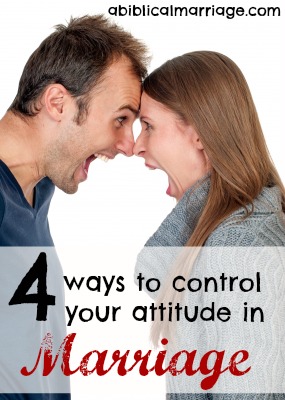In marriage, as in every other area of our lives that involves interacting with others, there is great importance in not just the words we say, but the way we say them. This is nothing new, of course. It literally goes back to the beginning of time!
“…but for Cain and for his offering He had no regard. So Cain became very angry and hiscountenance fell. Then the LORD said to Cain, “Why are you angry? And why has your countenance fallen? If you do well, will not your countenance be lifted up? And if you do not do well, sin is crouching at the door; and its desire is for you, but you must master it.”Genesis 4:5-7 NASB
It’s pretty evident that God wasn’t just upset at getting some lame veggies from Cain’s garden instead of a juicy animal sacrifice (as an aside, while I fully understand the deep theological implications of this passage, a small part of me – OK, a big part – would like to think the Creator of the Universe is also lending His support to us meat eaters!), He was also upset at Cain’s countenance, at his attitude toward the whole thing. In fact, God directly relates Cain’s countenance with his sin, and instructs him to master both.
In the end, Cain didn’t master his sin. Instead, he chose to let his foul mood master him, resulting in dire consequences for both him and his family. We, thankfully, being still alive and kicking on planet Earth, have the opportunity to make different choices!
Our countenance, our moods and attitudes, all play a critical role in how we are perceived by others. No matter what we choose to say, they are the aroma that permeates our words as they leave our lips. While our choice of words is certainly important, if they are said with venom, sarcasm, or disengagement, the stench that surrounds them will sabotage even our well-intended words, and make those we might mean to be constructive-criticism far from constructive. And when we do say things we shouldn’t say, a bad countenance can do damage that is difficult or impossible to undo.
For example, it’s so easy to let completely unrelated factors affect my relationship with my wife. When I come through the door after a particularly bad day at the office, often my countenance can still be downcast from that. Maybe my wife is looking forward to seeing me (hopefully!), to telling me about something special that happened with the kids or with her students (she’s a teacher). She hasn’t seen me all day. She doesn’t know I’ve had a bad day, that is, until I forget to kiss her hello, until I toss a dismissive glance in the direction of the stove and callously ask, “What’s that?”
-What’s that?? What’s THAT?!?!-
I’m not thinking about my wife or her feelings at that point, just about my bad day. And at this point, my wife, who hasn’t even heard anything about my bad day yet, is contemplating the bad evening I’m ABOUT to have! ![]() My negative countenance has dripped from the office into my marital relationship, causing me to act like a complete cad, and starting our evening off on not just the wrong foot, but the wrong universe.
My negative countenance has dripped from the office into my marital relationship, causing me to act like a complete cad, and starting our evening off on not just the wrong foot, but the wrong universe.
There are so many different ways a negative countenance can affect our relationships with our spouse, our children, and everyone else in our lives. Consequently, controlling our countenance is vitally important. I’m by no means an expert in this, here are a few tips I’ve learned along the way.
1) Compartmentalize
Compartmentalization is the ability to mentally separate the various aspects of our lives, to not let what happens in one bleed into how we perceive another. It’s said that guys (OK, especially serial killers) are better at compartmentalization than the rest of us (you know, the whole double-life thing and all that…), but in my opinion it gets a bad rap.
We should all work on letting our work stay at work, our home at home, and so on. Given that Jesus promised trouble in this world, the likelihood that something bad is happening in some aspect of our lives is pretty high, so the ability to not let that affect the other areas is critical.
2) Prioritize
With the overarching view that God is first, family second, work third, and so on, place priority on, and give your full attention to, where you are at the time.
3) Realize
Simply realizing and understanding how our countenance affects others will go a long way toward helping us to control it, regardless of how we are feeling inside. This affects literally everything and everyone. After all, who wants to get rung up by a rude cashier having a bad day at home?
4) Intentionalize
(OK, this isn’t really a word, technically, but hey, can you blame me for trying?) – Be intentionally aware, deliberate, choosing not only your words, but the WAY you deliver those words carefully.
Remember, God doesn’t like a bad countenance, and neither do the people in your life. Be the master of it – don’t let it master you!
This article first appeared on A Biblical Marriage.







